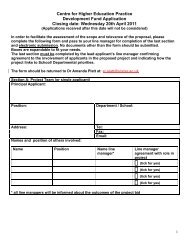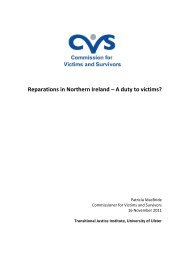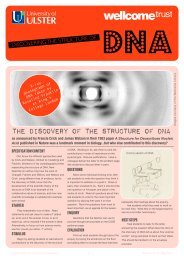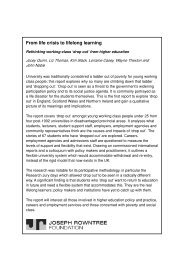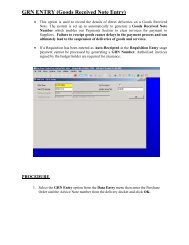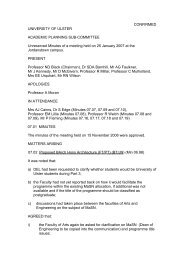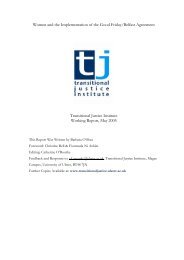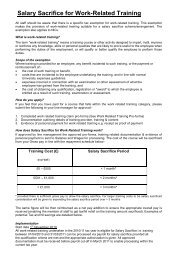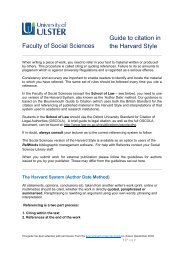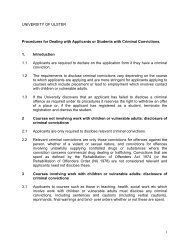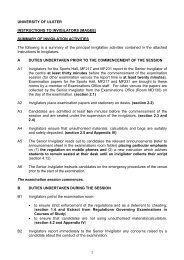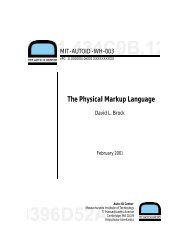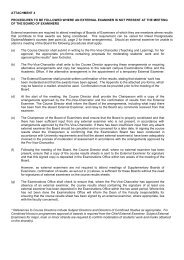ACTION PLAN - University of Ulster
ACTION PLAN - University of Ulster
ACTION PLAN - University of Ulster
Create successful ePaper yourself
Turn your PDF publications into a flip-book with our unique Google optimized e-Paper software.
Retention Planning Strategies<br />
? Recruiting. Providing students with adequate and accurate information will assist in<br />
the selection <strong>of</strong> an institution that best matches their needs, which in turn will<br />
increase their chances <strong>of</strong> persisting.<br />
? Admissions Selectivity. Academic ability is a strong predictor <strong>of</strong> student retention and<br />
there is clearly a relationship between the degree <strong>of</strong> admissions selectivity and<br />
institutional retention rates.<br />
? Financial Aid. The type and mix <strong>of</strong> financial aid provided to a student can have either<br />
a positive or negative influence on a student’s decision to remain in college<br />
depending upon their circumstances and background.<br />
? Orientation. Orientation programs are important to the successful integration <strong>of</strong><br />
students into the academic and social components <strong>of</strong> the campus environment. They<br />
also can be helpful in developing consonance between student expectations and the<br />
actualities <strong>of</strong> the educational environment.<br />
? Academic Advising. The importance <strong>of</strong> academic advising as a retention strategy is<br />
well documented in the literature. Advising provides the most significant mechanism<br />
by which students can clarify their educational/career goals and relate these goals to<br />
academic <strong>of</strong>ferings.<br />
? Sectioning/Placement. Homogeneous grouping <strong>of</strong> students based on their level <strong>of</strong><br />
academic ability is a common educational and retention strategy. Mandatory<br />
assessment and placement <strong>of</strong> students helps ensure that they can compete successfully<br />
academically.<br />
? Teaching/Learning. Academic programs and experiences must be consistent with and<br />
relevant to students’ educational/career goals. There is no substitute for good<br />
instruction in promoting academic integration. Some studies have shown a strong<br />
relationship between student learning and increased persistence.<br />
? Academic Support. Retention literature documents that academically underprepared<br />
students are more dropout-prone. Institutions should ensure that students enter with,<br />
or have the opportunity to acquire, the skills needed for academic success. Learning<br />
support programs improve a student’s chance <strong>of</strong> persistence.<br />
? Academic Enrichment. Academic boredom is a common reason talented students drop<br />
out <strong>of</strong> higher education. Providing enriched or accelerated programs can have a<br />
positive impact on the persistence <strong>of</strong> some <strong>of</strong> these students.<br />
? Residential Living. The quality <strong>of</strong> on-campus residential living is an important<br />
element in social integration.<br />
? Counseling. Personal counseling can be important in assisting students to overcome<br />
problems that interfere with the degree <strong>of</strong> academic and non-academic integration.<br />
? Extracurricular Activities. The literature indicated that significant and meaningful<br />
participation in extracurricular activities can contribute to student retention.



